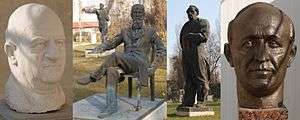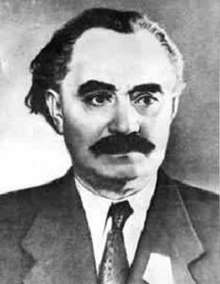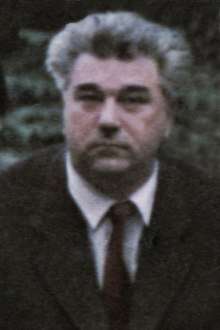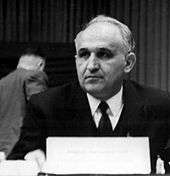Bulgarian Communist Party
The Bulgarian Communist Party (BCP; Bulgarian: Българска Комунистическа Партия (БКП), romanized: Bëlgarska Komunističeska Partija (BKP)) was the Communist and Marxist-Leninist ruling party of the People's Republic of Bulgaria from 1946 until 1989 when the country ceased to be a socialist state. The Bulgarian Communist Party had dominated the Fatherland Front coalition that took power in 1944, late in World War II, after it led a coup against Bulgaria's tsarist regime in conjunction with the Red Army's crossing the border. It controlled its armed forces, the Bulgarian People's Army.
Bulgarian Communist Party Българска Комунистическа Партия Bâlgarska Komunisticheska Partiya | |
|---|---|
 | |
| First leader | Dimitar Blagoev |
| Last leader | Alexander Lilov |
| Founded | 1919 |
| Dissolved | 3 April 1990 |
| Preceded by | Bulgarian Social Democratic Workers' Party (Narrow Socialists) |
| Succeeded by | Bulgarian Socialist Party |
| Headquarters | Sofia |
| Newspaper | Rabotnichesko Delo |
| Youth wing | Workers Youth League |
| Armed wing | Military organisation of BCP |
| Ideology | Communism Marxism–Leninism |
| Political position | Far-left |
| European affiliation | Balkan Communist Federation (1921–1939) |
| International affiliation | Comintern (1919–1943), Cominform (1948–1956) |
| Colours | Red, White |
| Anthem | The Internationale |
The BCP was organized on the basis of democratic centralism, a principle introduced by Russian Marxist scholar Vladimir Lenin which entails democratic and open discussion on policy on the condition of unity in upholding the agreed upon policies. The highest body of the BCP was the Party Congress, convened every fifth year. When the Party Congress was not in session, the Central Committee was the highest body, but since the body meets normally only once a year, most duties and responsibilities are vested in the Politburo and its Standing Committee. The party's leader has held the offices of General Secretary.
BCP was committed to Marxism-Leninism, an ideology consisted of the writings of the German philosopher Karl Marx and Lenin that was introduced in 1929 by Soviet leader Joseph Stalin in which the industries in Bulgaria were nationalized and a planned economy was implemented. In the 1960s, the BCP announced some economic reforms, which allowed the free sale of production that exceeded planned amounts. After Soviet leader Mikhail Gorbachev took power in 1985, the BCP underwent political and economic liberalization which promptly liquidated the party and dissolved the Bulgarian People's Republic completely. After the end of the BCP, the party was renamed to the Bulgarian Socialist Party in 1990.
History
The party's origins lay in the Bulgarian Social Democratic Workers' Party (Narrow Socialists) (Tesni Socialisti, "Narrow Socialists"), which was founded in 1903 after a split in the 10th Congress of the Bulgarian Social Democratic Workers' Party.[1]
The party's founding leader was Dimitar Blagoev, who was the driving force behind the formation of the BSDWP in 1894. It comprised most of the hardline Marxists in the Social Democratic Workers' Party. The party opposed World War I and was sympathetic to the October Revolution in Russia. Under Blagoev's leadership, the party applied to join the Communist International upon its founding in 1919. Upon joining the Comintern the party was reorganised as the Communist Party of Bulgaria.
Georgi Dimitrov was a member of the party's Central Committee from its inception in 1919 until his death in 1949, also serving as Bulgaria's leader from 1946. In 1938 the party merged with the Bulgarian Workers' Party and took the former party's name. In 1948 the BWP reunited with the Social Democrats to become the Bulgarian Communist Party once again.
Following Dimitrov's sudden death, the party was led by Valko Chervenkov, a Stalinist who oversaw a number of party purges that met with Moscow's approval. The party joined the Cominform at its inception in 1948 and conducted purges against suspected "Titoites" following the expulsion of the Communist Party of Yugoslavia from the alliance. Suspected counter-revolutionaries were imprisoned. In March 1954, one year after Joseph Stalin's death, Chervenkov was deposed.
From 1954 until 1989 the party was led by Todor Zhivkov, who was very supportive of the Soviet Union and remained close to its leadership after Nikita Khrushchev was deposed by Leonid Brezhnev. His rule led to relative political stability and an increase in living standards.[2] The demands for democratic reform which swept Eastern Europe in 1989 led Zhivkov to resign. He was succeeded by a considerably more liberal Communist, Petar Mladenov. On December 11 Mladenov announced the party was giving up its guaranteed right to rule. For all intents and purposes, this was the end of Communist rule in Bulgaria, though it would be another month before the provision in the constitution enshrining the party's "leading role" was deleted.
The party moved in a more moderate direction, and by the spring of 1990 was no longer a Marxist-Leninist party. That April, the party changed its name to the Bulgarian Socialist Party (BSP). A number of hardline Communists established several splinter parties with a small number of members. One of these parties, named Communist Party of Bulgaria (Komunisticeska Partija na Balgarija), is led by Aleksandar Paunov.
Leaders

Vasil Kolarov, Dimitar Blagoev, Georgi Dimitrov and Todor Zhivkov
The leaders of the Bulgarian Communist Party were:
- Dimitar Blagoev (1903 — 1924)
- Vasil Kolarov (1924 — 1933)
- Georgi Dimitrov (1933 — 1949)
- Valko Chervenkov (1949 — 1954)
- Todor Zhivkov (1954 — 1989)
- Petar Mladenov (1989 — 1990)
- Alexander Lilov (1990) Chairman
General Secretaries of the Bulgarian Communist Party (1948–1990)
| General Secretary | Term of office | Notes | ||||
|---|---|---|---|---|---|---|
| Nº | Portrait | Name (Born–Died) |
Took office | Left office | Duration | |
| 1 |  |
Georgi Dimitrov Георги Димитров (1882–1949) |
27 December 1948 | 2 July 1949 | 187 days | Also Prime Minister (1946–1949) |
| 2 |  |
Valko Chervenkov Вълко Червенков (1900–1980) |
2 July 1949 | 4 March 1954 | 4 years, 245 days | Also Prime Minister (1950–1956) |
| 3 |  |
Todor Zhivkov Тодор Живков (1911–1998) |
4 March 1954 | 10 November 1989 | 35 years, 251 days | Also Prime Minister (1962–1971), and Chairman of the Council of State (1971–1989) |
| 4 |  |
Petar Mladenov Петър Младенов (1936–2000) |
10 November 1989 | 2 February 1990 | 84 days | Also Chairman of the Council of State (1989–1990) |
Chairmans of the Bulgarian Communist Party (1990)
| Chairman | Term of office | Notes | ||||
|---|---|---|---|---|---|---|
| Nº | Portrait | Name (Born–Died) |
Took office | Left office | Duration | |
| 1 | Aleksandar Lilov Александър Лилов (1933–2013) |
2 February 1990 | 3 April 1990 | 60 days | Also Member of the Parliament (1962-2001) | |
References
External links
